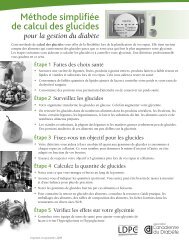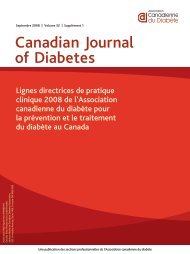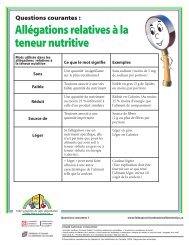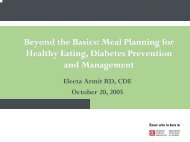2008 Clinical Practice Guidelines - Canadian Diabetes Association
2008 Clinical Practice Guidelines - Canadian Diabetes Association
2008 Clinical Practice Guidelines - Canadian Diabetes Association
Create successful ePaper yourself
Turn your PDF publications into a flip-book with our unique Google optimized e-Paper software.
<strong>2008</strong> CLINICAL PRACTICE GUIDELINES<br />
S26<br />
Interventions should focus on medications (including regimen<br />
changes and adherence), SMBG and physical activity to reduce<br />
A1C (10). For individuals with type 1 diabetes, education<br />
offered as part of intensified treatment interventions can result<br />
in long-lasting improvement in metabolic control and reduction<br />
in complications (14). Education for flexible insulin management<br />
and dietary freedom has been shown to improve<br />
quality of life as well as glycemic control (15,16).<br />
EMPOWERMENT<br />
Empowerment is an essential psychological component of<br />
SME (17). To implement interventions using an empowerment<br />
approach and ensure informed decision making, the educator<br />
should engage in the following behaviours: demonstrate<br />
acceptance (respect) for the individual’s perspectives; explore<br />
the affective or emotional aspect of an issue; work in an<br />
alliance or partnership with the individual; and facilitate active<br />
participation of all parties in the education process (18).<br />
Approaches that increase an individual’s participation and<br />
collaboration in decision making regarding care and education<br />
have been shown to be more effective than a didactic<br />
approach in enhancing psychological adjustment to diabetes<br />
and potentially preventing psychological distress (5,18-20).<br />
SUPPORT SYSTEMS<br />
Evidence suggests that including family members (parents,<br />
spouses, significant others) in educational interventions is beneficial<br />
for both children and adults in improving diabetesrelated<br />
knowledge and glycemic control (20). Interventions<br />
that target families’ ability to cope with stress or diabetesrelated<br />
conflict are effective (20). Peer programs geared<br />
toward developing self-efficacy (i.e. self-confidence in one’s<br />
ability to carry out a behaviour), sometimes referred to as<br />
“self-management” programs within the Chronic Disease<br />
Model, have demonstrated small improvements in psychological<br />
outcomes (21).<br />
Figure 1. Process of teaching people to manage their diabetes (adapted from 28)<br />
Self-management education<br />
Incorporate didactic, cognitive, behavioural and social<br />
interventions that include:<br />
• Goal-setting<br />
• Problem-solving<br />
• Other motivational strategies<br />
• Knowledge<br />
• Psychomotor skills<br />
Short-term outcomes<br />
• Glycemic, BP and lipid control<br />
• Weight<br />
• Quality of life<br />
• Attendance at healthcare<br />
provider appointments<br />
BP = blood pressure<br />
SMBG = self-monitoring of blood glucose<br />
Healthy self-management behaviours<br />
• Diet<br />
• SMBG<br />
• Medications<br />
• Physical activity<br />
• Smoking cessation<br />
Psychosocial mediators<br />
• Motivation (beliefs, attitudes)<br />
• Coping skills<br />
Long-term outcomes<br />
• Morbidity<br />
• Mortality<br />
• Quality of life











